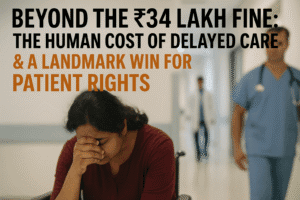Beyond the ₹34 Lakh Fine: The Human Cost of Delayed Care & A Landmark Win for Patient Rights
The Maharashtra State Consumer Commission slammed Wockhardt Hospital, Nashik, with a ₹34 lakh fine for a fatal 2010 delay in admitting Ravindra Naidu to the ICU after he collapsed with chest pain. Despite his critical condition at 3 AM, the hospital waited nearly four hours for signed family consent before acting – a delay deemed gross medical negligence that cost Ravindra his life.
Crucially, the court rejected the hospital’s excuses, affirming that emergency care is a constitutional right under Article 21. It established that “implied consent” applies in life-threatening crises – hospitals must prioritize immediate treatment over paperwork. This overturns dangerous precedents where bureaucratic hurdles trumped patient survival.
Beyond compensation for Ravindra’s grieving father after a 14-year battle, this landmark verdict demands systemic change: hospitals nationwide must rewrite protocols to ensure urgent care never waits for consent forms. It’s a hard-won victory affirming that when minutes decide life or death, hospitals must act first, explain later.

Beyond the ₹34 Lakh Fine: The Human Cost of Delayed Care & A Landmark Win for Patient Rights
The recent ruling by the Maharashtra State Consumer Disputes Redressal Commission, ordering Wockhardt Hospital, Nashik, to pay ₹34 lakh in compensation, is more than just a legal victory. It’s a stark, painful reminder of a life lost during a critical four-hour window, a 14-year battle for justice, and a seismic shift in defining emergency medical ethics in India. The case cuts to the heart of a fundamental question: When a life hangs in the balance, should bureaucratic procedure ever trump immediate, life-saving action?
The Tragic Timeline: Four Hours That Changed Everything
In April 2010, Ravindra Naidu was admitted to Wockhardt Hospital for a severe nosebleed. Around 3 AM on April 16th, tragedy struck – he fell in the hospital bathroom. Immediately after, he reported intense chest pain and severe discomfort, clear indicators of a potential cardiac emergency. His condition was visibly deteriorating.
Yet, despite these critical symptoms manifesting within the hospital walls, Ravindra was not transferred to the Intensive Care Unit (ICU) until approximately 7 AM. Why? The hospital insisted on obtaining a signed consent form from his family before initiating ICU care.
The Crux of Negligence: Consent vs. Crisis
During those agonizing four hours:
- Ravindra’s condition worsened significantly.
- His family alleges they were inadequately informed and denied access to him.
- The hospital’s primary defense – the need for signed consent – became the very evidence of its failure.
The Commission saw through other defenses offered (alleged family refusal, pre-existing conditions). It ruled unequivocally: This delay constituted gross medical negligence. The core failure was prioritizing administrative protocol over urgent medical necessity when faced with a clear, life-threatening emergency.
The Landmark Legal Principle: Implied Consent & The Right to Life
This ruling transcends compensation; it establishes a vital legal and ethical precedent:
- Emergency Care is a Constitutional Right: The Commission powerfully affirmed that the right to emergency medical treatment is intrinsic to the fundamental “Right to Life” guaranteed under Article 21 of the Indian Constitution.
- The Doctrine of Implied Consent: In life-threatening emergencies, explicit prior consent is not required. The law recognizes “implied consent” – the reasonable assumption that any person in peril would want life-saving intervention. Hospitals have not just the right, but the duty, to act immediately under this doctrine. Waiting for signed paperwork in such scenarios is a dereliction of duty.
The Systemic Failure and the Long Road to Justice
Ravindra Naidu’s father, Vijay, endured an unimaginable ordeal: losing his son, suspecting a cover-up (alleging treatment continued after death to manipulate records), and then facing an initial dismissal by the District Forum. His 14-year fight underscores the immense challenges families face in holding powerful medical institutions accountable.
This case exposes a critical vulnerability in Indian healthcare: the deadly gap where administrative hurdles (like rigid consent protocols) override clinical urgency. It highlights how a lack of clear, robust emergency protocols prioritizing immediate care can have fatal consequences.
Beyond the Verdict: Fostering a Culture of Care, Not Just Compliance
The ₹34 lakh compensation, while significant, cannot bring Ravindra back. Its true value lies in the powerful message sent to every hospital, public and private:
- Patient Welfare is Paramount: In an emergency, saving a life is the absolute, non-negotiable priority. Procedural formalities must yield to immediate clinical need.
- Review and Revise Protocols: Hospitals must critically examine their emergency response systems. Consent processes must explicitly incorporate the doctrine of implied consent for critical situations. Clear guidelines empowering medical staff to act decisively in emergencies are essential.
- Transparent & Empathetic Communication: Keeping families informed and involved, even amidst crisis, is not just ethical – it builds trust and prevents misunderstandings that fuel litigation.
- Staff Training: Frontline staff, from nurses to administrators, need training to recognize emergencies and understand the legal and ethical imperative of immediate action without delay for non-clinical reasons.
A Call for Reflection and Reform
The Wockhardt ruling isn’t just about one hospital or one tragic night in 2010. It’s a mirror held up to systemic flaws that persist. It challenges us to ask:
- How many similar delays happen quietly, without legal recourse?
- Are our hospitals truly designed to prioritize the “right to life” in those critical first moments?
- How can we ensure that empathy and urgency are embedded in hospital culture as deeply as compliance protocols?
Vijay Naidu’s long battle secured justice for his son and set a crucial precedent. The real tribute to Ravindra, and the true measure of this ruling’s impact, will be if it catalyzes a fundamental shift – ensuring that in Indian hospitals, when seconds count, life-saving care is never, ever held hostage by a pen and a form. The right to life demands nothing less
You must be logged in to post a comment.